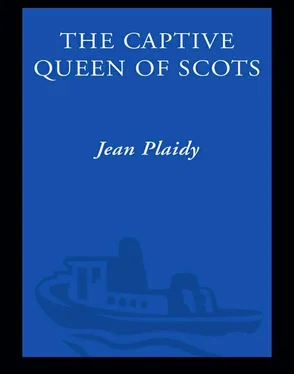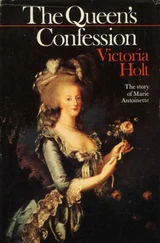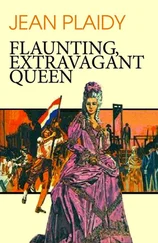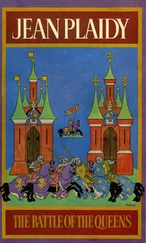Виктория Холт - The Captive Queen of Scots
Здесь есть возможность читать онлайн «Виктория Холт - The Captive Queen of Scots» весь текст электронной книги совершенно бесплатно (целиком полную версию без сокращений). В некоторых случаях можно слушать аудио, скачать через торрент в формате fb2 и присутствует краткое содержание. Жанр: Исторические любовные романы, на английском языке. Описание произведения, (предисловие) а так же отзывы посетителей доступны на портале библиотеки ЛибКат.
- Название:The Captive Queen of Scots
- Автор:
- Жанр:
- Год:неизвестен
- ISBN:нет данных
- Рейтинг книги:3 / 5. Голосов: 1
-
Избранное:Добавить в избранное
- Отзывы:
-
Ваша оценка:
- 60
- 1
- 2
- 3
- 4
- 5
The Captive Queen of Scots: краткое содержание, описание и аннотация
Предлагаем к чтению аннотацию, описание, краткое содержание или предисловие (зависит от того, что написал сам автор книги «The Captive Queen of Scots»). Если вы не нашли необходимую информацию о книге — напишите в комментариях, мы постараемся отыскать её.
The Captive Queen of Scots — читать онлайн бесплатно полную книгу (весь текст) целиком
Ниже представлен текст книги, разбитый по страницам. Система сохранения места последней прочитанной страницы, позволяет с удобством читать онлайн бесплатно книгу «The Captive Queen of Scots», без необходимости каждый раз заново искать на чём Вы остановились. Поставьте закладку, и сможете в любой момент перейти на страницу, на которой закончили чтение.
Интервал:
Закладка:
Eventually Mary wrote to Sir Henry and Lady Pierpont telling them that she thought it was time they took their daughter into their home.
IN AN INN PARLOR not far from St. Giles’s-in-the-Fields a priest sat waiting for a visitor. His outstanding features were his burning fanatical eyes, and as he waited he drummed his fingers on the table impatiently. Eventually he was joined by a man in the uniform of a soldier.
“Pray be seated,” said the priest.
The soldier obeyed, drawing his chair close.
“I know we can trust each other,” went on the priest. “My name is John Ballard and we have mutual friends. I know you to be John Savage and that we hold similar views.”
“I believe Thomas Morgan has recommended me to you,” Savage murmured.
“That is so. You are the one who is ready to give his life for the Faith. That is all that matters. Danger lies ahead of us, my friend. Are you afraid of danger?”
“I am not afraid to die for my faith.”
“That is what I understood. Believe me, my friend, all of those who are ready to work in this project must hold those views.”
“Will you enlighten me?”
“With pleasure. I believe—and I am sure you as a good Catholic will agree with me—that no good can come to England while we have a Protestant bastard on the throne.”
“I believe with all my heart that no good can come to England until she returns to the Catholic Faith.”
“Then, my friend, we are in accord. It is our endeavor to bring back the Catholic Faith and, as we can only do so by removing Elizabeth, we plan to do exactly that and set Catholic Mary in her place.”
“Who else is with you in this enterprise?”
“Certain gentlemen whom you shall meet without delay. Do you wish to go further?”
“I wish it with all my heart,” replied John Savage.
IT WAS GROWING DARK when the two men made their way to a house in Fetter Lane. Ballard gave three slow knocks on the door which after a while was opened.
He stepped into a dark passage, and Savage followed him. The man who had opened the door, recognizing Ballard, nodded an acknowledgment, and they followed him down a flight of stairs and along a corridor. When they reached a certain door, this was quietly opened by Ballard, and Savage saw that he was about to enter a dimly lighted room which, it soon became apparent, had been made into a chapel; he saw the altar and, standing about it, several men.
Ballard announced: “John Savage. He is one of us.”
An unusually handsome man stepped forward and grasped Savage’s hand.
“My name is Anthony Babington,” he said quietly. “Welcome to our band. We were about to hear Mass. You will join us?”
“With all my heart.”
“Afterward we will go to my house in the Barbican and there you will become acquainted with my friends.”
Savage bowed his head, and the Mass began.
When they had left Fetter Lane for the house in the Barbican, Anthony Babington entertained his friends with food and wine, and after they had been served he bolted the doors and assured himself that nothing which was said in the room could be heard by anyone outside it.
Babington, Savage realized, was a man in his middle twenties. He was somewhat flamboyant in dress as he was in manner and his handsome features glowed with an enthusiasm which was infectious. Babington believed wholeheartedly in his plot; he could not visualize failure, and such was his personality that everyone around that table caught his fervor.
He took the center of the stage and dramatically explained why this party of men were gathered together in such secrecy.
“My friend,” he said, “now that you have joined us we are thirteen in number. But do not think we are alone. Once we are ready we shall find the entire Catholic Nobility of England behind us. And we have allies outside England. This is no Northern Rising, gentlemen. This is going to be the revolt against Protestantism which will change the course of our country’s history. The Pope is with us. The King of Spain is with us. And once we have removed the bastard from the throne, these powerful allies will come to our aid.”
He looked around the assembly, his eyes glowing.
“John Savage,” he went on, “I will now introduce you to your colleagues.” He pointed to the man who sat on his right hand. “Edward Abington,” he said. Savage inclined his head in greeting which was returned by Abington. Then he indicated the others who sat around that table and the procedure was repeated: “Edward Windsor, Edward Jones, Chidiock Tichbourne, Charles Tilney, Henry Donn, Gilbert Gifford, John Traves, Robert Barnwell, Thomas Salisbury.”
When the greetings were over, Babington said: “Now pray be seated and we will talk together.”
Savage took his seat and Babington went on to explain the conspiracy, which he had been chosen to lead. It was well known on the Continent, he explained, that he was an ardent Catholic, devoted to the cause of the Queen of Scots. The core of the plot was to bring England back to the Catholic Faith and to free the Queen of Scots, but there was one deed which must be performed before this could be achieved: the assassination of Elizabeth. Once Elizabeth was dead the King of Spain and the Pope would not hesitate to give their open support. Therefore their first task was to plan that assassination. When the time was ripe Babington proposed to call for six volunteers for this most important task. In the meantime there were minor details to be discussed.
“I will inform the Spanish ambassador that we rely on Philip II above all, and that it is because of his encouragement and promises of help that we have the zeal and courage to go on with this dangerous plan. We shall ask for an assurance that, as soon as Elizabeth is dead, help reaches us from Spain and the Low Countries. Ships in the Thames must be seized. Cecil, Walsingham, Hunsdon and Knollys must be immediately either captured or killed. I shall inform the Queen of Scots of our intention.”
Charles Tilney put in: “Is it wise to tell her of the intention to murder Elizabeth? I have reason to believe that she will not readily agree to be party to such a deed.”
Babington was thoughtful and others added their doubts to Tilney’s.
They should go cautiously in their communication with the Queen of Scots who was, after all, a prisoner in the hands of their enemies.
“Letters will have to be smuggled to her,” pointed out Henry Donn. “A dangerous procedure.”
Gifford spoke then. “I do not think you need fear, my friends. We have a very good method of conveying letters to the Queen. The brewer of Burton is an honest man whom we can trust. The Queen must be prepared for rescue. It would be unwise to keep her in the dark.”
There was clearly a divided opinion on this matter and it was temporarily shelved.
But when the meeting was over and the conspirators went their various ways, Gifford returned to the house to speak to Babington; they sat for a long time discussing the plot, and Gifford did not have great difficulty in persuading Babington that it would be advisable to inform Mary of their intentions.
ANTHONY BABINGTON was a vain young man. Extremely handsome, elegant and wealthy, he had been intended for the Bar, but had abandoned this career for a fashionable life on the fringes of the Court. He had divided his time between that Court and his vast estates at Dethick. During the last few years he had also traveled abroad and, because he must be the center of attention, he had become known as an ardent Catholic, and a man of adventure, so that he had been noticed as a suitable leader to be remembered when such a one was needed—for his vitality, enthusiasms, wealth and charm were invaluable.
Читать дальшеИнтервал:
Закладка:
Похожие книги на «The Captive Queen of Scots»
Представляем Вашему вниманию похожие книги на «The Captive Queen of Scots» списком для выбора. Мы отобрали схожую по названию и смыслу литературу в надежде предоставить читателям больше вариантов отыскать новые, интересные, ещё непрочитанные произведения.
Обсуждение, отзывы о книге «The Captive Queen of Scots» и просто собственные мнения читателей. Оставьте ваши комментарии, напишите, что Вы думаете о произведении, его смысле или главных героях. Укажите что конкретно понравилось, а что нет, и почему Вы так считаете.










